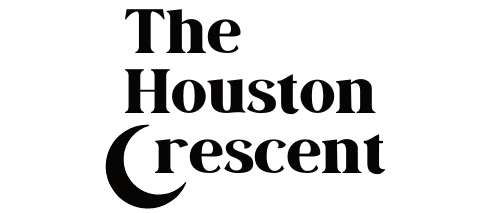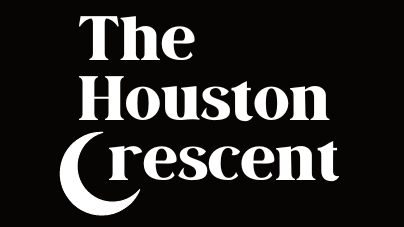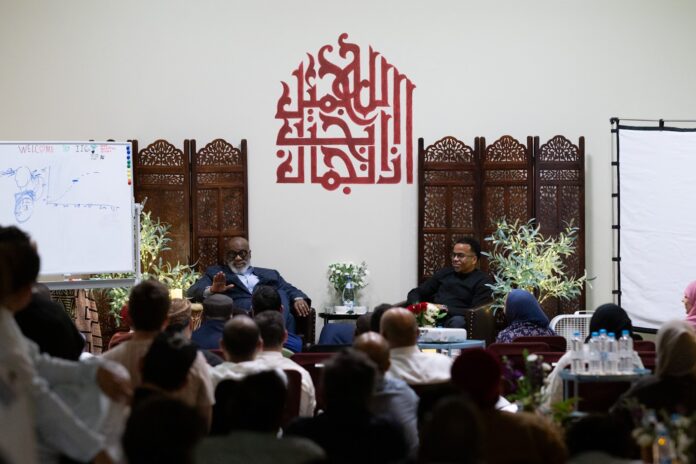Written by Safiyah Ahmed
(*Dr. Sherman Jackson & Sheihk Khalis Rashaad)
Ibrahim Islamic Center– a mosque and community situated in Houston’s Third Ward – recently witnessed a spiritual convergence like no other as it celebrated the auspicious Night of Power with none other than Dr. Sherman Jackson. Muslims from all over Houston and different ethnic backgrounds joined together for the sake of Allah, seeking good suḥbah (companionship), ‘ilm (knowledge), and most importantly: ‘ibadah (worship).
Dr. Jackson is an alumnus from the University of Pennsylvania, and a current professor of Islamic Studies at the University of Southern California. He has published multiple works including, Islam and
the Blackamerican, Islam and the Problem of Black Suffering, and The Islamic Secular. Known for his insightful, passionate, and brilliant lectures, Muslim Houstonians had a lot to look forward to, and the IIC community was eager to welcome him into their space, especially on a night of such sublimity.
(*Dr. Sherman Jackson speaking at the IIC)
The Night of Power (also known as Laylatul Qadr) is deeply ingrained in the tapestry of Islamic tradition, holding great significance for Muslims around the world. It commemorates the night when the first verses of Quran were revealed to Prophet Muhammad (ﷺ) by the Angel Gabriel. Having occurred during the last ten nights of Ramadan, it is considered the holiest night of the year in Islam. The Quran describes the Night of Power as “better than a thousand months” (Surah Al-Qadr, 97:3), highlighting its immense spiritual importance. It is a time of deep reflection, supplication, and devotion.
Narrated by Abu Huraira:
The Prophet Muhammad (ﷺ) said: “…whoever stood for the prayers in the night of Qadr out of sincere Faith and hoping for a reward from Allah, then all his previous sins will be forgiven” (Sahih Bukhari Vol. 3, Book 32, Hadith 231).
On this sacred night, with the soothing scent of musky incense wafting through the air and ambient lights and decorations adorning the mosque, the stage was perfectly set for a night of reverence and profundity. Amidst this tranquil ambiance, Dr. Jackson took the floor with his thought-provoking discussion.
Dr. Jackson began by exposing a deficit that affects American Muslims. The Ummah’s ability to believe in miracles tends to be weak because of how much people distance themselves from the Quran. He passionately articulated that, “As much as the Quran is about informing us, it’s also about transforming us; And not everything that transforms you is something that you understand.” Maintaining belief in the miraculous is crucial for Muslims, as its loss would signify a consequential setback for the vitality of the religion. One cannot lose this capacity when reading the Quran. When Muslims are unable to believe in miracles while observing the power that the West holds, they can easily lose hope.
He then discussed the hardships of being a Muslim in the West. Unfolding in real-time is the total devaluation of Muslim life, as seen happening with Palestine and the Uyghurs. He expressed how Muslims, particularly Black Americans, can truly understand what “…the decimation, dehumanization, and total devaluing of your people in utter contempt” can do to you from the inside. Islam’s dignity needs to be restored in the world, “so that it can assume its proper place as a model for humanity.” However, the Ummah is taking different routes; some are focused on assimilating with the West, whilst others are focused on indigenizing. Muslims should be striving to achieve the latter route, because when assimilation is sought, traditional Islam is lost. This is due to modernity producing an entirely different context for Islam. Things that used to be considered moral are now considered evil (and often labeled as “oppression”), and thus the religion is demonized. Dr. Jackson expressed that the way we can counter this is to “have a vision of Islam that begins with Islam, engages modernity…and recognizes its place in transforming modernity.”
Many Muslims are not worried about this, however, because they are doing quite well on their own, and are therefore not thinking about the collective to which they belong. However, the individual fate of a Muslim is tied to the collective fate of the Ummah, and that is a reality that Dr. Jackson brought to light when he professed, “You want to be a Muslim…but you look at your collective, and its place in the world, and you don’t want to be Muslim…you are a house divided within itself.” The Ummah needs to eliminate this double-consciousness.
In Islamic history, once Muslims started making pilgrimages to the Ka’ba, Islam became an indigenous, Arab religion in that area. The number of Muslims between that time and the conquest of Mecca went up exponentially, with no new conquests. So when one looks at the past, it can be concluded that the Ummah has the capability to do this in the West. However, the question becomes: Does the Ummah truly believe in its capacity to do this?
Dr. Jackson explained that, “With regard to the indigenization of Islam in this country, the Black American Muslim community is key…You have a people who cannot be alienated from the society…Nobody can tell them to go home.” However, there is a noticeable divide between various Muslim immigrants and Black American Muslims. Although there is a necessity to cultivate a more organic mindset regarding the mission of the Ummah, if they don’t trust each other, it can’t be done. Dr. Jackson finished by saying, “If we don’t do that, we’re going to remain divided, no matter what we say. Rhetoric alone is not going to solve this.”
(*Taco truck outside IIC during the NOP)
After ending on this note, the audience dispersed and drifted around the room, sharing their thoughts with one another.
Sakina Freeman, a 74-year-old Black Houstonian, converted to Islam in 1989 and has been a member of the IIC community since 2014. She related some feedback on Dr. Jackson’s talk, saying, “I also experienced some of the divide that exists between the African-American Muslim community and other immigrant communities…I hope that we can overcome it. His talk has given me a lot of incentive to talk amongst my peers about how we can indigenize Islam in America, and what that looks like.” Sister Sakina admires Dr. Sherman Jackson’s scholarly contributions, having purchased some of his books and recognizing him as a knowledgeable Muslim.
Ashley is a 26-year old African-American who is also a convert, and took her shahadah at IIC just this February. She too gained a lot of insight from Dr. Jackson’s thought-provoking lecture. She said, “The thought that resonated with me is continuing to bring to light the double-consciousness that a lot of people go through. Educating myself more on the correct way to bring it to light without judgment: that was something that stuck with me.” Ashley grew up in foster care as a Christian. However, she had always felt that she had a connection with something outside of Christianity. When she did some research on her roots from Ghana, she discovered that her biological family had been Muslim. When asked about IIC, she eagerly said, “I love it! After I said my shahadah, I got to hug everyone and it felt so good.”
(*Amna Mulla, one of the evenings MCs)
Sister Amna Mulla, one of the board advisors for IIC, also explained her story of how she came to be a part of the community: “I walked into Ibrahim Center…looked around, and I was shocked as to what I found. I was traveling all over the world at the time…looking for this kind of community, this level of diversity, and this quality of suḥbah…because I was trying to figure out where I belong in Islam.” Sister Amna then decided to stay and invest in this one community, and for the past 12 years, the IIC community has been significantly growing and flourishing.
(*Meleekah Villegas and Mohammad Jibreel)
The assortment of Muslim backgrounds at IIC is something that doesn’t go unnoticed. 18-year-old Mikael Khan, hafiz of Quran, led the Taraweeh prayer with captivating recitation prior to the main program. Although not a regular IIC-goer, when asked about his impression of the center, he said, “There are a lot of different Muslims over here. I’ve never seen masjids this diverse before.”
(*children playing in the kids room)
Additionally, the youth programs are exceptional at IIC. Children in the program during this event explained how they enjoyed a variety of activities. Zayn, an 11-year old American with a Malaysian-Pakistani background, stated, “I had a lot of fun today. I played soccer outside, a little volleyball, made playdough, and I made Eid crafts for my mom and dad.”
(*Packed house at the IIC during the NOP)
The essential pillars that built Ibrahim Islamic Center to be this kind of loving home are: love and service, sincerity, excellence, and sacred companionship. Sister Amna explained that, “Our core tenet is that we plant the seed of light, and we water it with love.” These core values have truly come to fruition with the successful event on the Night of Power this Ramadan.
(*All photos are credited to Hamza Rashaad)


